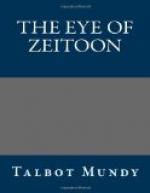“I have always kept a little in reserve. At one time money in a bank. At another time money buried. Sometimes a place to run and hide in. Now and then a plan for my own safety in case a defense should fail. Never have I given absolutely quite all, burning all my bridges. Had I been Larry Atkins I would not have gambled with the money of a man who trusted me; but, having lost the money, I would not have sent my diamond and the watch and chain! Neither, if the horse and saddle bad been within my reach would I have sent an order to deliver those! That is why Zeitoon has never altogether trusted me! Some, but never all, until to-night!
“My brother—”
He stood up, with the motions of a man who is stiff with weariness.
“I salute you! You have taught me my needed lesson!”
“I wonder!” whispered Fred to me. “Remember Peter at the fireside? Methinks friend Kagig doth too much protest! We’ll see. Nemesis comes swiftly as a rule.”
I shoved Fred off his balance, rolled him over, and sat on him, because cynicism and iconoclasm are twin deities I neither worship nor respect. But at times Fred Oakes is gifted with uncanny vision. While he struggled explosively to throw me off, the door began resounding to steady thumps, and at a sign from Kagig, Maga opened it.
There strode in nine Armenians, followed closely by one of the gipsies of Gregor Jhaere’s party, who whispered to Maga through lips that hardly moved, and made signals to Kagig with a secretive hand like a snake’s head. I got off Fred’s stomach then, and when he had had his revenge by emptying hot pipe ashes down my neck he sat close beside me and translated what followed word for word. It was all in Armenian, spoken in deadly earnest by hairy men on edge with anxiety and yet compelled to grudging patience by the presence of strangers and knowledge of the hour’s necessity.
When the gipsy had finished making signals to Kagig be sat down and seemed to take no further interest. But a little later I caught sight of him by the dancing fire-light creeping along the wall, and presently he lay down with his head very close to Rustum Khan’s. Nothing points more clearly to the clarifying tension of that night than the fact that Rustum Khan with his notions about gipsies could compel himself to lie still with a gipsy’s head within three inches of his own, and sham sleep while the gipsy whispered to him. I was not the only one who observed that marvel, although I did not know that at the time.
The nine Armenians who had entered were evidently influential men. Elders was the word that occurred as best describing them. They were smelly with rain and smoke and the close-kept sweat beneath their leather coats—all of them bearded—nearly all big men—and they strode and stood with the air of being usually heard when they chose to voice opinion. Kagig stood up to meet them, with his back toward the fire—legs astraddle, and hands clasped behind him.




